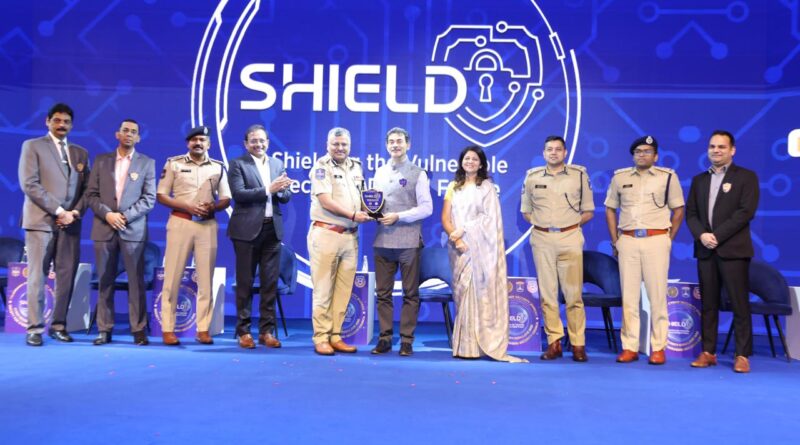SHIELD 2025 Concludes with a Bold Vision for Cyber Resilience in Telangana and Beyond
(Judicial Quest News Network)
Hyderabad, February 19, 2025: The second and final day of SHIELD 2025, Telangana’s flagship cybersecurity conclave, wrapped up on a high note today at the Hyderabad International Convention Centre (HICC), cementing the state’s commitment to fortifying its cybersecurity infrastructure and fostering robust global partnerships. Hosted by the Telangana Cyber Security Bureau (TGCSB), Cyberabad Police, and the Society for Cyberabad Security Council (SCSC), the conclave brought together a distinguished mix of law enforcement officers, industry leaders, policymakers, and academia to address the rapidly evolving landscape of cyber threats and innovative security solutions.
The day commenced with a keynote address by Rajesh Kumar, IPS, CEO of the Indian Cyber Crime Coordination Centre (I4C), who emphasized India’s proactive approach in combatting cybercrime. He outlined how I4C has been instrumental in coordinating law enforcement efforts and supporting initiatives like the National Cybercrime Reporting Portal (NCERT) and the 1930 Cybercrime Helpline, which have assisted over 6,000 victims of online fraud, including sextortion and digital extortion. Kumar also highlighted India’s expanding cyber defense strategy to combat cryptocurrency-based crimes, which has helped prevent fraudulent transactions worth ₹2,600 crore.
As cyber threats continue to grow in sophistication, the conclave discussions underscored the critical need for stronger legal frameworks, improved enforcement mechanisms, and state-level cyber response units. Experts agreed on the importance of mandatory cybersecurity training in educational institutions and nationwide awareness programs to equip citizens and organizations with the tools to protect their digital assets. Another pivotal topic was the regulation of AI misuse and the enforcement of stricter data protection laws to ensure accountability for digital platforms. A key initiative discussed was the “Sahyog” portal, which facilitates rapid takedown of harmful online content, enhancing the security of the digital space.
Later in the day, Dr. Lalith Mohan, CPO of Seqrite, and Dr. B. Sriram, CEO of DSCI, presented the highly anticipated Telangana Cyber Threat Report. Vishal Salvi, CEO of QuickHeal, remarked on Telangana’s emergence as a key IT hub and the inevitability of rising cyber threats as the state drives India’s digital economy forward. He urged organizations to bolster their cybersecurity measures with advanced solutions such as QuickHeal AntiFraud.AI and Seqrite Threat Intelligence to stay ahead of evolving cyber threats.
The conclave featured several insightful panel discussions covering critical cybersecurity concerns, such as cyber hygiene, online financial fraud, and social engineering threats. Topics like “Unraveling Cybercrimes – From Complaints to Prosecution” and “Combating Misinformation in the Age of AI” delved into the complex challenges of dealing with cybercrime in the digital era. Workshops on AI and cybersecurity for students also emphasized practical solutions and proactive awareness-building efforts. A special session for law enforcement agencies (LEAs) on cryptocurrency-related crimes highlighted the need for collaborative strategies to tackle financial fraud in the digital age.
The conclave concluded with a grand closing ceremony attended by Sri Jayesh Ranjan, IAS, Special Chief Secretary, Department of Information Technology, Electronics & Communications (ITE&C) and Industries & Commerce, Telangana; Dr. Jitender, IPS, Director General of Police, Telangana; Sri Avinash Mohanty, IPS, Commissioner of Police, Cyberabad; and several other key figures in the cybersecurity space.
Sri Avinash Mohanty, IPS, Commissioner of Police, Cyberabad, opened the ceremony by underscoring the importance of sustained collaboration among law enforcement, industry, and academia in strengthening the state’s cybersecurity framework. Smt. Shikha Goel, IPS, Director of TGCSB, celebrated the overwhelming participation of over 1,000 delegates and stressed the need for AI-driven cybersecurity initiatives, financial fraud prevention, and misinformation management. She also announced the formalization of MoUs with IIT Hyderabad, NALSAR, and ISB to foster research, legal policy advancements, and workforce development in cybersecurity. The launch of the Cyber Fusion Center (CFC), Cyber Protection Unit (CPU), and the Security Operations Center (SOC) was highlighted as a milestone in enhancing real-time cyber threat monitoring and response capabilities.
In his address, Dr. Jitender, IPS, Director General of Police, Telangana, spoke about the ever-growing sophistication of cyber threats and the need for continuous upskilling of law enforcement officers to combat them effectively. He emphasized the role of AI-based investigative tools and cross-border intelligence sharing in the fight against cybercrime.
The Chief Guest, Sri Jayesh Ranjan, IAS, Special Chief Secretary of IT, Telangana, delivered a compelling speech on the importance of cybersecurity in safeguarding digital transactions, KYC frameworks, and two-factor authentication (2FA). He praised Telangana’s strong cybersecurity network, which has protected government infrastructure from potential threats, and highlighted the importance of responsible AI usage in preventing its misuse in cybercrimes such as ransomware and digital fraud.
The ceremony closed with a heartfelt vote of thanks from Sri Ramesh Kaza, Secretary General of SCSC, who commended the joint efforts of law enforcement, industry leaders, and academic partners in shaping a secure digital future. He reiterated the importance of collaboration in strengthening the state’s cybersecurity landscape.
SHIELD 2025 successfully brought together over 1,000 delegates from 14 states, sparking vital discussions, partnerships, and initiatives aimed at strengthening cybersecurity across the nation. The conclave’s insights and strategic recommendations are expected to serve as a solid foundation for future efforts to build a cyber-resilient future, ensuring a safer digital ecosystem for individuals, businesses, and governments alike.



